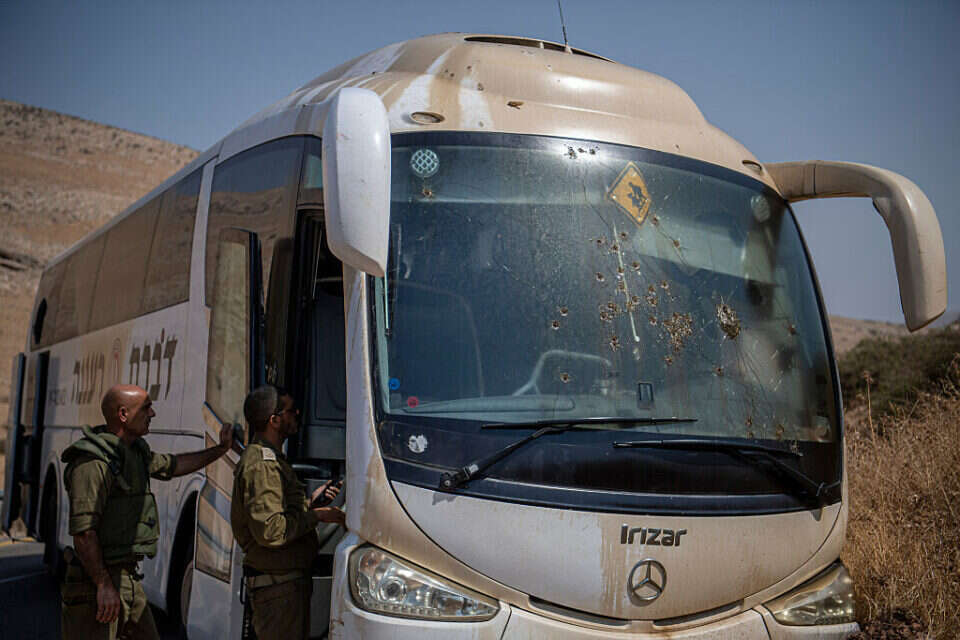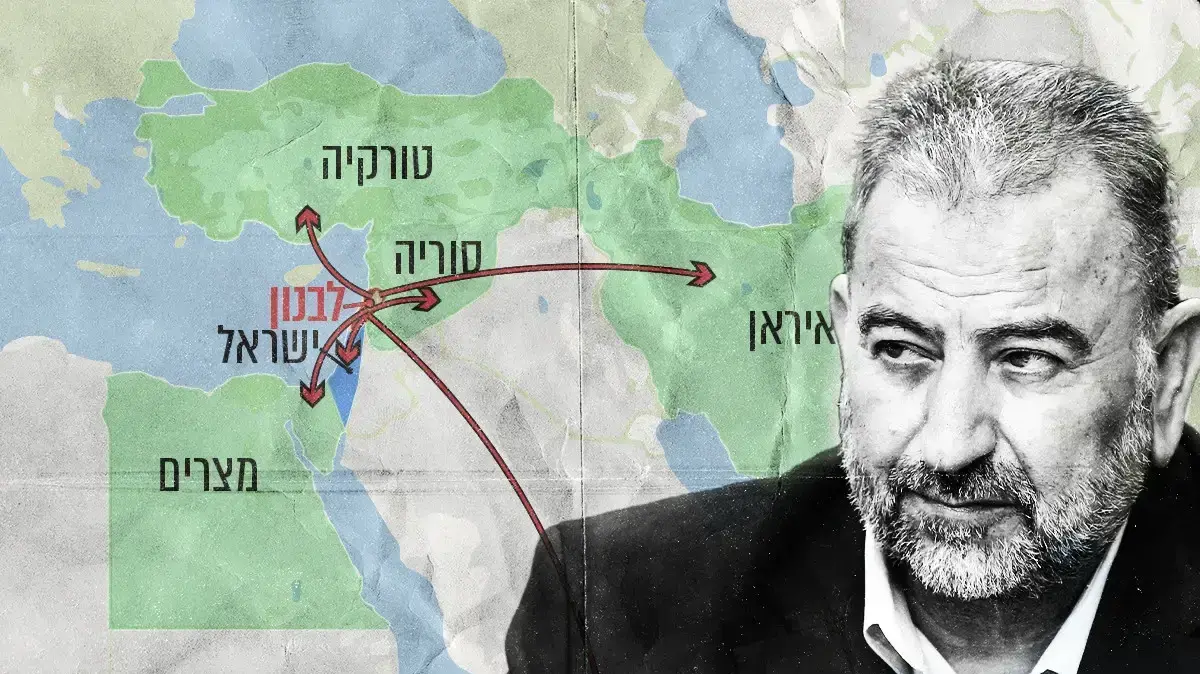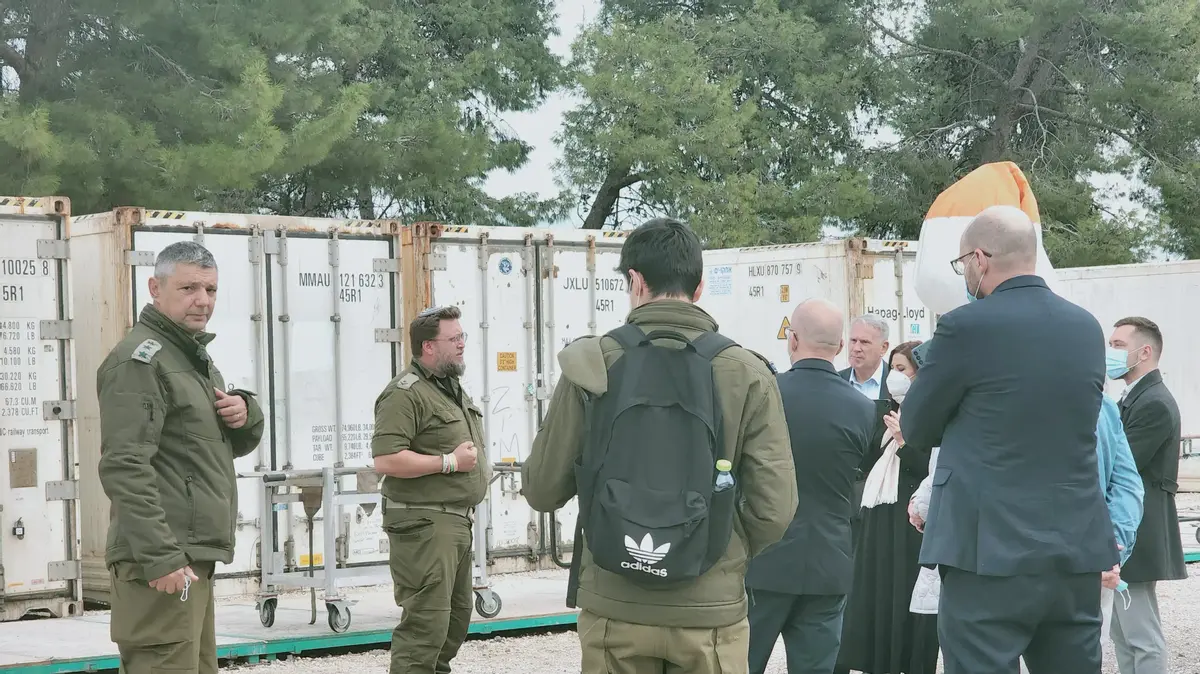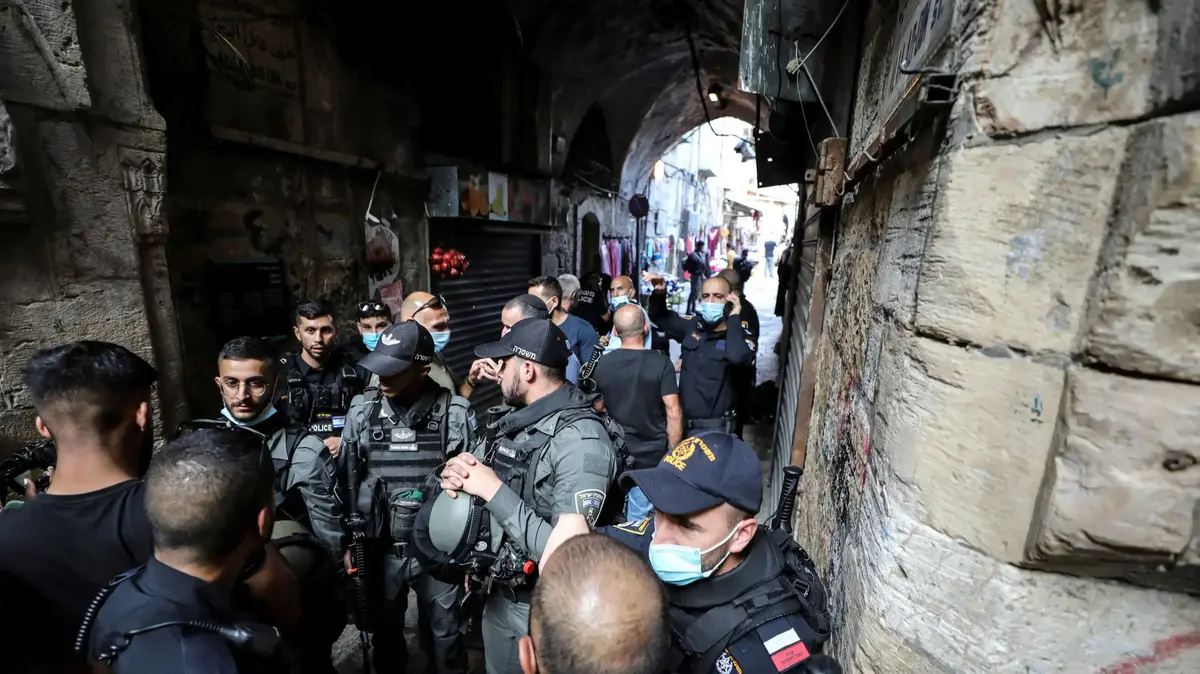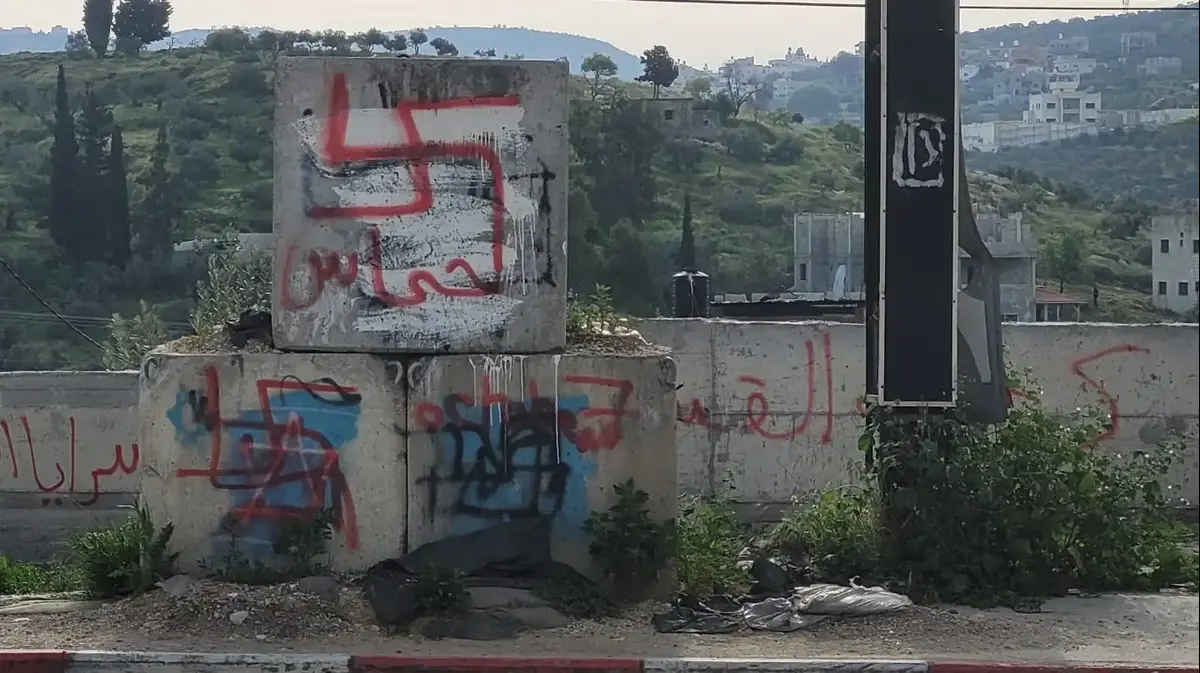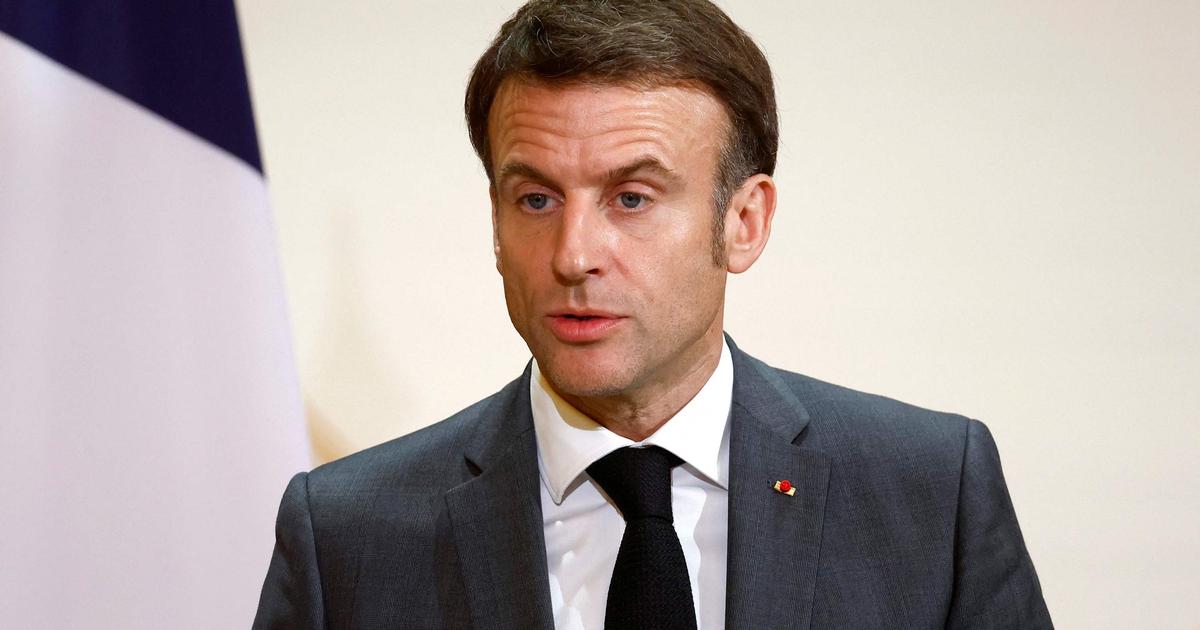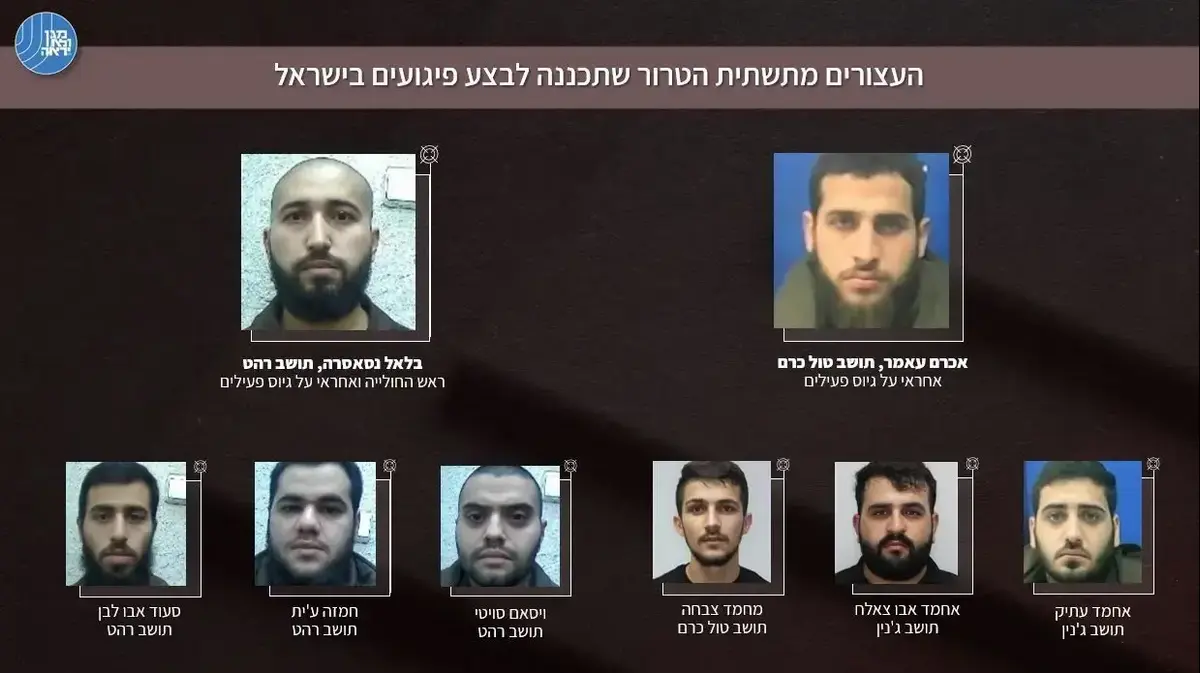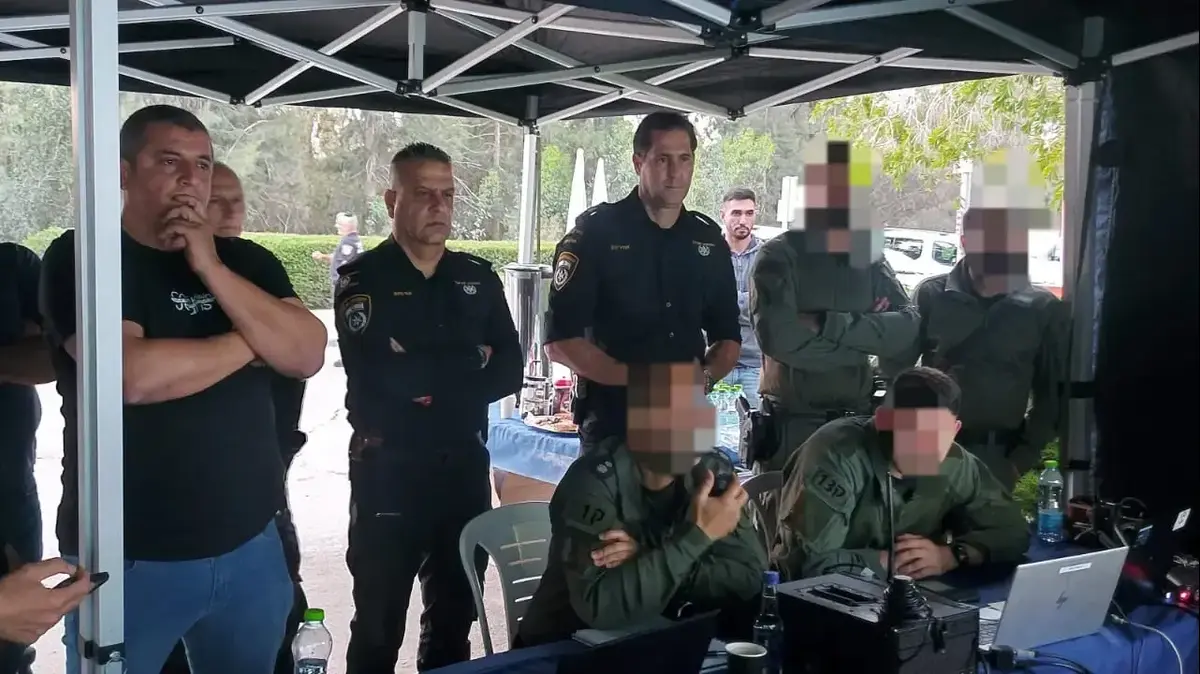"Are you alive?" I asked Menesh Shmueli, the field coordinator of the Regavim movement, when we met on a tour of the Na'ala settlement in Binyamin at the beginning of the week.
Two days earlier, during a routine patrol he conducted near the settlement of Kiryat Arba, on the other side of Judea and Samaria, terrorists opened fire on him.
Miraculously, the bullets missed their target, one more in a never-ending series of miracles in recent weeks in Yosh. Menash smiled and said, "In a small way." But there is nothing "in a small way" about the situation in which the residents of Judea and Samaria have found themselves in recent months, and which is very disturbingly reminiscent of the events who started the "Al-Aqsa Intifada" exactly 22 years ago. The word miracle, get a spoiler, will come up again and again in this article, because if it weren't for miracles, we would have been in a completely different reality a long time ago.
A routine, a hallucination
In recent weeks, a silent war broke out all over Judea and Samaria.
It is true that Operation Shaver Galiv has been going on for many months in Jenin and Nablus, but something has changed recently.
It began with massive stone throwing, some as a direct response to IDF activity and others unrelated. Much more stone throwing compared to what happened before, in the "normal" situation, if you can define it that way, in the "archaeological" area between Kiryat Arba and Tzur vineyards , at the Ezon intersection and in the villages of Pondok and Hawara in Samaria, and in the Arab pocket in the eastern Gush Etzion. Every day, almost non-stop. Imagine a situation where you are driving on a calm road, music in your ears, the little boy in the back seat is playing with some kind of toy, and suddenly BOOM! Block in the front or back seat Glass, screams, miraculously it ended "only with scratches". The media will define it as a "very easy" situation, if they even address it.
Throwing stones in Hvara near the Yitzhar HaGadol intersection, damage Shamshe.
There are no casualties." A routine, a hallucination.
Yossi Dagan, head of the Samaria Regional Council: "If there were 20 shooting attacks on Dizengoff Street in Tel Aviv, Operation Protective Wall 2 would already be in full swing, but when there are attacks in the Gaza Strip or in the West Bank, it probably has a low rating."
Then, quietly, the shooting attacks began.
About two months ago, the turnaround began, with the shooting attack at Yosef's Tomb in which three Israelis were wounded, including then-Shomron Brigadier General Roi Zvik, and from there the situation worsened: an ambush by terrorists near the village of Jalma in an incident in which Nahal officer Bar Falah was murdered, the attack Towards the soldiers' bus in the Jordan Valley, an explosive device that did not explode at the gas station in Kedumim, and much more.
For the sake of illustration, just last week, terrorists fired at an Israeli vehicle near Naguhot on Mount Hebron and at the houses of the settlement of Kiryat Arba, Kochav Ya'akov and Mount Bracha.
Last Monday, four Israelis were injured - two as a result of terrorist shootings near the Beit Furik intersection near Mount Bracha, and two more, including a pregnant woman, from throwing stones.
The word miracle is also relevant here - the barrel is a bit to the right, the stone is a bit to the left, and we are in an event with casualties, God forbid.
In the first shooting attack, which took place near Mount Bracha, it was a taxi that was on its way to bring special education students and an empty, bulletproof student bus that absorbed the fire.
The risk potential here is huge.
The data also show a tremendous escalation in the field.
The Shin Bet's monthly terror report indicates that in September two people were killed, along with 14 wounded.
The dead - Bar Falah near the crossing of Jalma and Shulamit Rachel Ovadia, 85 years old, in Holon.
The killer in the second case is a terrorist resident of Kalkilia.
If resourceful policemen had not identified the terrorist in Jaffa who was heavily armed, September would have ended with many more deaths.
If the terrorists hadn't missed Menesh Shmueli, he wouldn't be here to tell.
If the taxi driver Shimon Sebag had taken a bullet in his back instead of only a scratch, perhaps another name would have been engraved on the monument that is placed at the site of the attack, in memory of Rabbi Itam and Naama Henkin who were murdered there exactly seven years earlier.
Four were injured last month in the shooting attack in the Jordan Valley, where they managed to take control of the bus before it overturned.
Grocery list, a lifetime.
The numbers are also scary.
53 pipe bomb detonations, 34 small arms shooting incidents, 139 Molotov cocktails incidents, four trampling attacks, four stabbing attacks, and hundreds of stone throwing that no one can really keep track of.
For the sake of comparison, in all of 2020, according to the Shin Bet, 56 significant attacks occurred in Judea and Samaria and Jerusalem. In 2016, which included part of the knife wave, 119 significant attacks occurred. It should be understood that even within Judea and Samaria, the residents are not always aware of the extent of the attacks and assassination attempts by Israelis on "I'm looking for details of the terrorist incidents that happened on Rosh Hashanah," a resident contacted me a week ago, and after I sent her a cluster that included dozens of incidents, she replied with four astonished words: "Wow, listen, this is crazy."
Dean Yosh Kodin Dizengoff
Yonatan Hershlag, a resident of Beitar Illit, entered Kfar Husan last Saturday night to get his son's truck out of repair.
In recent years, in the shadow of the relative calm, this has become a routine - Israelis enter the villages to repair cars or go shopping and the world goes on as usual, but no one informed the residents of YOS that the reality has changed.
"Moments after we entered the outskirts of the village, dozens of young men with covered faces and stones in both hands jumped at us. My son made a quick gallop, but some of the stones had already hit me. I was sitting in the chair next to the driver and the stone hit my head. It was very scary. We drove straight to Shaare Zedek Hospital In Jerusalem. I had five stitches in my head. I didn't know it was problematic to enter this village, now I won't enter anymore."
"We could be at dozens of funerals now," says Assaf Mintzer, head of the Elkana Council, in frustration.
Last Monday, at the initiative of the Yesha Council, most of the heads of the authorities in Judea and Samaria gathered in Rosh Ha'Ain, in front of the Defense Minister's house, with a double demand - to start what they defined as "Operation Protective Wall 2", with the slogan that was the tip of the spear in the second intifada, and which teaches more than anything about The mood at the moment in the Yash - "let the IDF win".
"The only thing that separated a bus of slaughtered and dead children from our situation today is miracles. Yesterday a bus of children was hit by bullets, yesterday a bus of special education children in a taxi was shot at, and luckily it was only the drivers. The 'luck' in quotation marks is that after The demonstration in Samaria 'only' a soldier injured his leg and not all the children and all the adults who were there. Someday this luck will run out, and we cannot play with this luck. We must not rely on the miracle. We are all united in the struggle, which is not only for Samaria, but also for Rosh Ha'Ain, Tel Aviv , the entire State of Israel. We need to understand that if this goes through us, the state's rabies, it will reach the entire State of Israel, and then we will lose everything."
"I want to say something difficult," Yossi Dagan, head of the Samaria Council, sharpened his tone.
"If there were 20 shooting attacks in Dizengoff in Tel Aviv, Operation Protective Wall 2 would already be in full swing. This government neglects the security of its citizens, both in Judea and Samaria and in the rest of the State of Israel. I say this with great sadness, but when there are attacks in the Gaza Strip or in the It probably has a low rating.
"I want to say to all those people who think that the attacks in the Gaza Strip or the Yosh are less ratings than other places: two weeks ago a terrorist who came from northern Samaria - the place where you uprooted the settlements - was caught with a rifle in the Clock Square in Jaffa.
Two weeks ago it was in Tel Aviv and now it is in Samaria.
If the government does not come to its senses and does not stop this wave of terrorism and does not go into Operation Protective Wall 2, God forbid there will be a wave of terrorism in the entire State of Israel.
I say to the government, come to your senses now, do now what you will do after 20 funerals, God forbid.
We are here because we are afraid of funerals not only in Judea and Samaria but in the entire State of Israel," added Dagan.
That the army will replace a diskette
Last Sunday, after the two shooting attacks in Samaria, the commander of the IOS division, Avi Belot, came to talk with residents from the area at the Balon Mora synagogue. He confronted the angry residents and tried to convince them that the IDF controls the area.
"I am responsible for security and the feeling of security, and I am not limited in the activities that I have permission to do," he told them.
The heads of the councils were not convinced by these statements.
"The feeling that emerges from the army is that they are 110 percent active, but someone needs to change a diskette and understand that the reality has changed," a senior official at the Yosh told me. The IDF has many code names for its hostile sabotage activities in recent years - individual terrorism, local squad, and a thousand and one Other definitions, but the residents of Yosh believe that this numbs the area. "Instead of calling it by its name - intifada, war - they define it by names and label it.
What do I care that this is a local squad?
This squad is armed and dangerous."
The method used by the IDF in recent years, and even more so in recent months, in Operation Breakwater, is simple - powerful and aggressive activity in the risk areas, mainly Jenin and Nablus, and maintaining a normal life in the rest of the West Bank.
Normally this works great - the terrorists are busy with the last meeting of their lives with the soldiers of the Navy, Dovdvan or the Golani patrol, and the rest of the uninvolved, Israelis and Palestinians alike, can continue their lives as much as possible as usual. This method has led to the fact that while in Jenin there are battles on the verge of an operation Wide scale, in relatively calm Tulkarm. The violations of order by the Palestinians in Judea and Samaria amount to small numbers and not thousands upon thousands.
The problem, say the senior officials in Judea and Samaria, is that while the IDF is trying to contain the events, in practice it has already begun spilling out, as evidenced by the recent shooting attacks. While the IDF, they say, is trying to contain the events inside Jenin, in practice the roads in Samaria are becoming a trap Death is possible for the residents.
Therefore, they call for the return, among other things, of the means they used in the second intifada - checkpoints inside Judea and Samaria, and not just crossings into the Green Line as is the case today, and blocking dirt roads through which the terrorists escape into the territories of the Palestinian Authority.
There are no soldiers deep in the area
Heavy darkness reigned over the Nablus mountains on Monday as residents left their homes and began their journey to the roads that surround the Palestinian city.
The morning after the two shooting attacks on Israelis, the residents decided on their own that they could no longer take it.
It's time for action.
At half past four, while the Palestinian drivers started their way to work, the Israeli residents blocked the exits from the big city.
"We arrived at 4:30, the peak time for residents to leave Nablus for their work day, at all entrances to the city, and we blocked them for two hours - near Yitzhar, near Itamar and near Shevi Shomron, as an act of protest. The Arabs should know that we cannot accept the escalation of events with equanimity, and so Also the security system," says Pinchas Michaeli, a resident of Itamar, one of the leaders of the protests that also took place the next day.
"Today, a terrorist can leave the house with a weapon or cargo and move freely on all the roads in Yosh, near trampiadas or settlements, without meeting a soldier or a checkpoint.
Our demand is clear - an inspection for every vehicle, to make sure there is no terrorist.
The blood of the residents of Samaria is no less red than that of the residents of Rosh Ha'Ein, and just as there is a barrier in front of Rosh Ha'Ein, so there needs to be a barrier in front of the Israeli settlements."
Michaeli himself was not at the meeting with Brigadier General Blot, as he was preparing for the blockades, but the representatives of the Gev Harer settlements who were at the meeting who reported on the meeting said that he did not lose anything. "Unfortunately, there were no innovations there.
The army has shown no willingness to change the paradigm.
On Sunday there was a shooting attack at a bus from a kilometer away, from a mountain that is in front of the road.
The security concept requires that there be soldiers in the surrounding domes afterwards, but in the evening there was another attack in the same area with a similar outline.
There are no soldiers deep in the territory, there are no forces in the territories that surround us and that are under Palestinian control.
We are busy defending and not attacking."
The demonstrators came for two days to the roads and blocked them as a popular protest.
"We were not afraid," Michaeli replies to the obvious question.
"These are the roads we travel on. These are our lives, and if we don't do it we will live together. We did the protest so that people don't have to be afraid on the road, so that everyone who comes to us knows that the roads are safe. Our message is clear - when we have no routine the enemy will have no routine Those who need to change their behavior are those who give shelter to terrorism."
Without Joseph's tomb
Yom Kippur, which fell on Tuesday evening, froze the situation among Israelis, who in this region are overwhelmingly religious.
Michaeli says that, despite the security tensions, there was no serious fear in Yosh ahead of the holiday. "Thank God, life here is happy and the routine of life continues.
There is no change in the day-to-day conduct, but there is a clear demand to change the security reality, so that God forbid there is no situation where we go to funerals instead of celebrations."
Although the routine of life continues overall despite the events, with the clear and demonstrable encouragement of the security forces who seek to differentiate between the conflict in the Palestinian cities and the routine on the roads and settlements of Yosh, there was one change this week, which was made in cooperation with the Samaria Council but is highly symbolic. For the first time in a long time it was decided Cancel the entry of worshipers to Joseph's Tomb, which was supposed to be last Monday. After rumors spread that the entries were canceled until further notice, the council clarified that this was only a postponement, but the symbolic date cannot be ignored. The entry was supposed to be on October 3, just two days after Commemorating 22 years since the desecration of Madhat Yosef in Nablus, one of the events that started the second intifada.
On Thursday, all the authorities in Judea and Samaria were closed, and many of the council's employees came to demonstrate in front of the home of Defense Minister Benny Gantz.
This is another act of protest on the part of Yosh residents, who want to break the routine of life in order to show all the citizens of Israel what they are going through.
"We will not be promiscuous in the field and we will not be like ducks in the range," says the head of the Yesha Council and the head of the Gush Etzion Council Shlomo Naman.
Let them starve for bread.
They won't have a normal life when our kids can't drive safely to school or we can't drive safely to work.
They give up our sea to Lebanon, and turn Judea and Samaria into South Lebanon.
This is out of the question.
We will not be silent, we will disrupt life.
If the Israeli government does not release the hands of the IDF, we will be in the position of protecting the lives of our residents. We do not want to get to that position."
"The blood of the residents of Judea and Samaria is no less red than the blood of the residents of Tel Aviv or the residents of Rosh Ha'Ein," says Hananal Durani, head of the Council of Ancients.
"Every attack like this should be treated as if it killed a civilian or a bus of children. If an incident like this happened in Rosh Ha'Ain, the whole country would be on its feet and the IDF would have been inside the Palestinian cities a long time ago.
We feel we are promiscuous.
Another attack and another attack.
This lawlessness must be stopped.
We have no claim against the IDF or the Shin Bet, they know the job.
They do holy work night after night.
But a paradigm shift is needed.
Stop supporting the Palestinian Authority, which encourages terrorism, and tell the IDF to leave forever. Not to respond to attacks but to take the initiative, to go in. There was relative silence here for a decade, there is no reason for us to go back to the sights before the Magen Wall. If we go back to them, we will go back to the Magen Wall. We will enter the tunnels of life and end their lives."
There are currently dozens of warnings of imminent attacks in Judea and Samaria, and the IDF is working day and night to try to stop the threats. The problem is that we may already be in a different world, where it is not enough to perform a surgical operation and it is necessary to make a political decision to act in a much more massive and significant way, and this is the demand of the residents of "That.
At the moment, at least, it does not seem that we are at the end of the event, and the graduates of the previous intifada feel that the worst is yet to come.
"It reminds us of that time, and it scares us a lot," says Assaf, a resident of Samaria.
"Today it is our neighbor from a nearby town who was shot in the car, and tomorrow it will be us. We fear that we are at the beginning of a new intifada, and no one is ready to wake up and act on the scale required to stop it. We are in danger of our lives. Someone must act - and quickly."
were we wrong
We will fix it!
If you found an error in the article, we would appreciate it if you shared it with us

